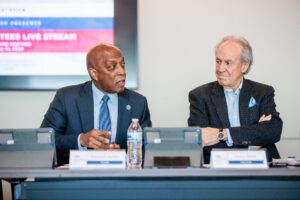Metropolitan State University of Denver’s Board of Trustees focused on the institution’s fiscal health Friday, voting to approve a new policy that will require the University to hold in reserve an amount equal to 15% of its annual expenditures.

The new policy will ensure that the University can continue to operate under varying circumstances and will allow MSU Denver to fund new capital projects and academic programs, while safeguarding the institution against emergencies, said Chief Financial Officer Jim Carpenter.
The University’s reserves are currently at 12% of expenditures, and under the new policy it will have until fiscal year 2028 to meet the 15% standard, he said.
Additionally, University leaders will have to seek board approval to tap into reserve funds. If, however, there is an urgent need to use reserves between board meetings, the CFO is required to notify the Board’s Finance Committee chair before doing so.
The change in policy reflects best practices from the Government Finance Officer’s Association, which recommends at least two months’ worth of operating expenses in reserves. It is common for similar institutions to have 15% to 20% of educational and general expenditures covered in their reserve fund, Carpenter said.
In addition to addressing reserve funding, the board approved amendments to MSU Denver’s budget for the current fiscal year, which was approved in June 2023. Trustees also approved budget increases for organizations funded by the Student Affairs fee to reflect higher than expected fee revenues.

“The (2030) Strategic Plan is the guide; the budget is the rudder,” said Budget Director Andrew Rauch, who reviewed the costs and fiscal health of the University with the board.
The fiscal cliff of pandemic funding and the variability of state funding and enrollment are risks to the University’s budget. However, Rauch explained how the University took advantage of one-time and limited-time pandemic funding to invest in larger projects, including the purchase of new enterprise-resource planning software, or ERP.
“Workday is an ERP that Fortune 500 companies are using, so you picked a Cadillac ERP platform,” said Trustee Russell Noles, who remains on the board after serving as chair. “Not only does it make decision-making better, but it will improve the day-to-day operations and transitioning to an environment where we let machines do what machines can do so that people can do the more important work.”
Changes to program offerings
Shaun Schafer, associate vice president of Curriculum, Academic Effectiveness and Development, brought forth a proposal to create nine new academic programs while discontinuing six others.
Trustees voted to approve Schafer’s recommendations for creation of the following programs:
- Accelerated B.S. to M.S. Concentration, Nutrition and Dietetics Major (College of Health and Human Sciences)
- American Chemical Society Post-Baccalaureate Bridge Program (College of Letters, Arts and Sciences)
- Asian Studies Minor (College of Letters, Arts and Sciences)
- Chemical Industry, National and Government Laboratory Post-Baccalaureate Bridge Program (ING-BP) (College of Letters, Arts and Sciences)
- Culinary Nutrition Certificate (School of Hospitality)
- Data Science and Machine Learning Major, B.S. (College of Aerospace, Computing, Engineering and Design)
- Didactic Program in Dietetics Post-Baccalaureate Certificate (College of Health and Human Sciences)
- Dietetics Concentration and General Nutrition Concentration, Master of Science in Nutrition (College of Health and Human Sciences)
- Economics Major, B.S. (College of Business)
After receiving background information on Schafer’s proposal from Faculty Senate President Liz Goodnick, Ph.D., School of Hospitality Interim Dean Annie Butler, Ph.D., and Jeffrey Newcomer, Ph.D., dean of the College of Aerospace, Computing, Engineering and Design, trustees voted to discontinue the following:
- Assorted Concentrations, Human Services Major (College of Health and Human Sciences)
- Assorted Concentrations, Management Major (College of Business)
- K-12 Music Licensure: Post-Baccalaureate Program (School of Education)
- Outdoor Recreation and Adventure Tourism Certificate (School of Hospitality)
- Outdoor Recreation and Adventure Tourism Management Concentration, Hospitality Leadership Major (School of Hospitality)
- Sustainable Systems Engineering Major (College of Aerospace, Computing, Engineering and Design)
New board leadership
The meeting welcomed new board leadership and board members. Trustees Kristin Hultquist and Jerry Glick officially took over as chair and vice chair of the board, respectively. Three newly appointed trustees – Ryan Frazier, Rachel Kaygi and Laura Pinnie – joined for their first board meeting.

Former Board Chair Noles will serve as chair of the Finance Committee. He was recognized at the meeting for his trailblazing leadership as the first African American and first alumnus to chair MSU Denver’s governing body.
President Janine Davidson, Ph.D., and the board also recognized former Trustee Albus Brooks, whose term has ended.
“Continue to lean in hard,” Brooks advised. “Continue to ask the hard questions, and I think great things will come.”
Additional updates
- Interim Provost Marie Mora, Ph.D., updated the board on the work of the Cross-Functional Taskforce on Faculty Workload. Incoming Provost Laura Niesen de Abruña, Ph.D., and Davidson will review and approve plans, with implementation to start next fall.
- Kaycee Gerhart, vice president of Government Relations and External Affairs, reviewed the state’s higher-education funding proposal and the University’s response.
- Chief Enrollment Officer Long Huynh, DBA, reviewed enrollment and retention trends, which were the best MSU Denver has seen in about a decade.
- Christine Márquez-Hudson, vice president of University Advancement, briefed the board on progress on the current capital campaign and an agreement for a large gift to the Health Institute.
- Leone Dick, chief of staff to the chief operating officer, reviewed best practices and learnings from a recent risk-management conference. The trustees approved her proposal to engage a risk-management consultancy for one year.
The Board of Trustees at MSU Denver is responsible for the governance of the University and has authority over and control of its assets and resources. Click here to listen to a recording of the meeting.

